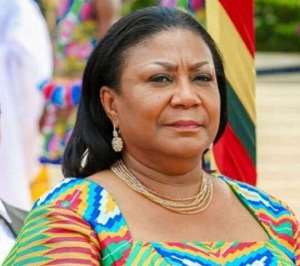
The First Lady, Mrs Rebecca Akufo-Addo, has called for a strong leadership drive, common purpose and urgent actions from stakeholders as key elements to eliminate Female Genital Mutilation (FGM) globally.
She said since the practice involved human lives, in deeply rooted cultures across many regions including Africa and Asia, there was the need to mobilise stakeholders like governments, policy makers, civil society organisations, as well as resources to facilitate measures to eradicate FGM.
Mrs Akufo-Addo explained that the practice, which involved the cutting of some vital parts of the female genitalia, left victims to suffer great pain, excessive bleeding, difficulty during sexual activity, infections, psychological trauma, and obstetric complications that may lead to fistula or maternal mortality.
FGM, she said, was also expected to be a contributory factor to the high maternal deaths in Africa, and although strategies and actions such as legislations, education and information campaigns had been undertaken, over the past years to discourage the practice, much still remained to be done.
Speaking at the opening of a two-day International Meeting on FGM in Accra on Wednesday, Mrs Akufo-Addo appealed to all stakeholders, nationally and internationally, to intensify their actions aimed at curbing the harmful and primitive cultural practice under which girls, who were as young as four weeks to 12 years, were made to suffer.
She said that practice did not only infringe upon the fundamental rights of women and girls, but was detrimental to their health and development, as it robbed females of the right over their natural sexual functions, invaded their privacy regarding sexuality, as well as violated their rights to security.
She said the meeting, which was being hosted by the Ghana Health Service in collaboration with the UNFPA, was part of the activities to commemorate the annual Regional Meeting of African Union Ministers of Health on the Campaign on Accelerated Reduction on Maternal, Newborn and Child mortality in Africa (CARMMA).
Mrs Akufo-Addo said: 'FGM is a gender-based violation that clearly takes away the human rights and autonomy of females and also seeks to control females' sexuality.'
This, therefore, forced girls to undergo the practice and robbed them of their right to make independent decisions in matters affecting their own bodies, she said.
She said available data did not show any known benefits of the primitive cultural practice, but had only presented horrific captions from women and girls who had gone through the negative ritual, some of which had ended up fatally recording hundreds of lost lives.
Mrs Akufo-Addo said more work must be done in the areas of education and information, public awareness creation, and legislation and prosecution in line with the African Union Commission's Protocol on the Rights of Women in Africa, which clearly articulated what governments needed to be done to address FGM to safeguard the rights of females.
'We can use legislation, create new bodies and strengthen existing mechanisms to develop and coordinate programmes and use Child Protection laws to intervene and prevent abuses,' however it was widely acknowledged that laws alone cannot change deeply held attitudes regarding FGM.
She called for strong and sustained community education and outreach programmes about the harmful effects of FGM, to change behaviours and attitudes, and improve access to Sexual and Reproductive Health information and resources for women and girls to fully understand their rights while governments provided medical care and counselling for victims.
Mr Mabingue Ngom, the Regional Director of the West and Central Africa Region of the UNFPA, noted that more than three million girls were at risk of FGM every year, and expressed worry about the slow progress towards the fight of the canker.
He called for a global action towards the eradication of the harmful practice and accelerate progress to end FGM before 2030.
GNA
By Christabel Addo/Elsie Appiah-Osei, GNA




 Minority will expose the beneficial owners of SML, recover funds paid to company...
Minority will expose the beneficial owners of SML, recover funds paid to company...
 Prof. Opoku-Agyemang has ‘decapitated’ the NPP’s strategies; don’t take them ser...
Prof. Opoku-Agyemang has ‘decapitated’ the NPP’s strategies; don’t take them ser...
 Abubakar Tahiru: Ghanaian environmental activist sets world record by hugging 1,...
Abubakar Tahiru: Ghanaian environmental activist sets world record by hugging 1,...
 Prof. Naana Opoku-Agyemang will serve you with dignity, courage, and integrity a...
Prof. Naana Opoku-Agyemang will serve you with dignity, courage, and integrity a...
 Rectify salary anomalies to reduce tension and possible strike action in public ...
Rectify salary anomalies to reduce tension and possible strike action in public ...
 Stop all projects and fix ‘dumsor’ — Professor Charles Marfo to Akufo-Addo
Stop all projects and fix ‘dumsor’ — Professor Charles Marfo to Akufo-Addo
 Blue and white painted schools will attract dirt shortly – Kofi Asare
Blue and white painted schools will attract dirt shortly – Kofi Asare
 I endorse cost-sharing for free SHS, we should prioritise to know who can pay - ...
I endorse cost-sharing for free SHS, we should prioritise to know who can pay - ...
 See the four arsonists who petrol-bombed Labone-based CMG
See the four arsonists who petrol-bombed Labone-based CMG
 Mahama coming back because Akufo-Addo has failed, he hasn't performed more than ...
Mahama coming back because Akufo-Addo has failed, he hasn't performed more than ...
